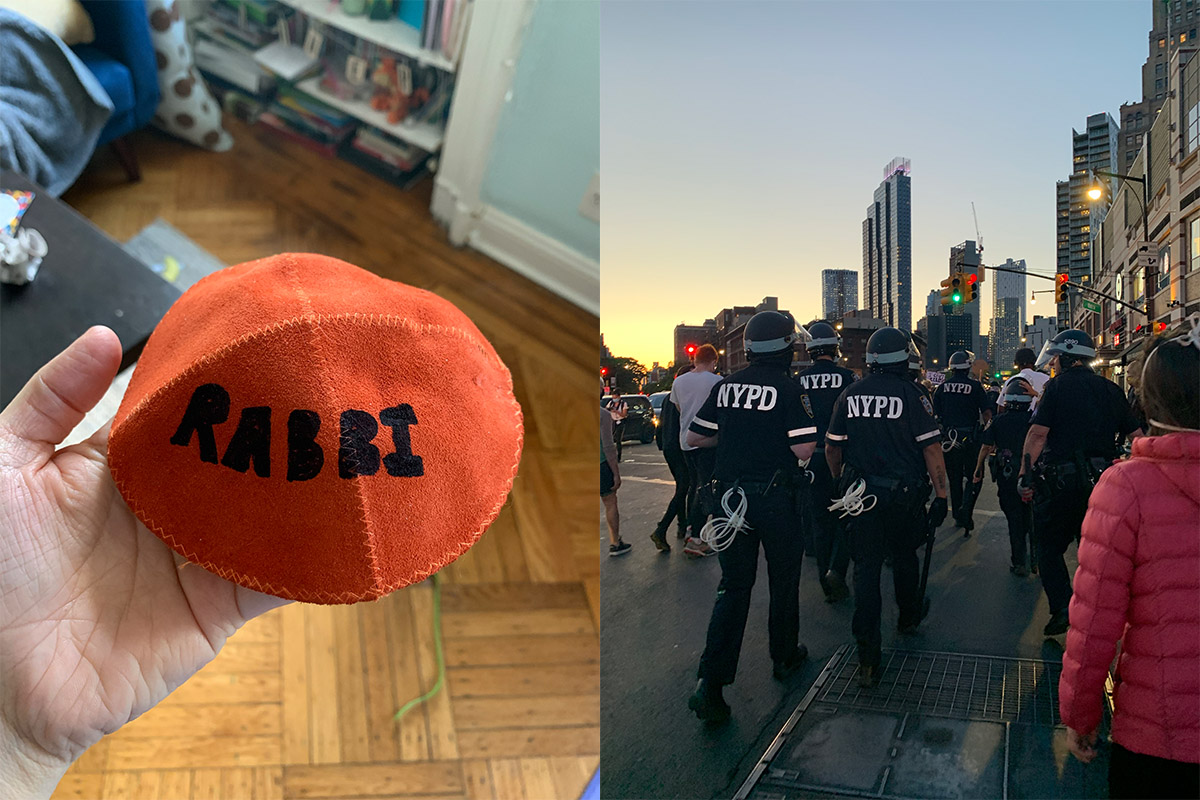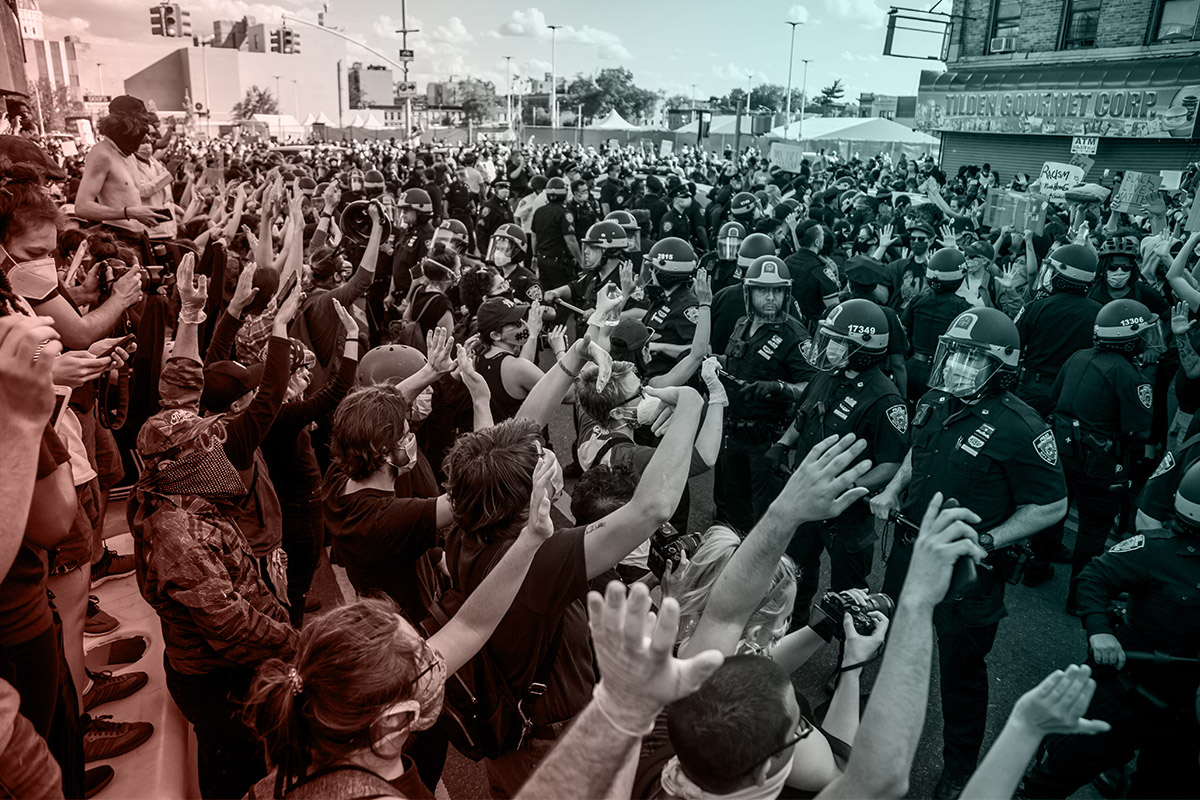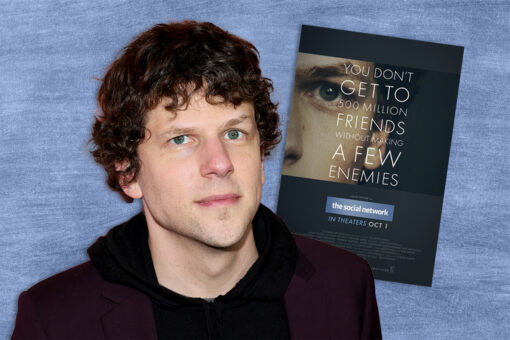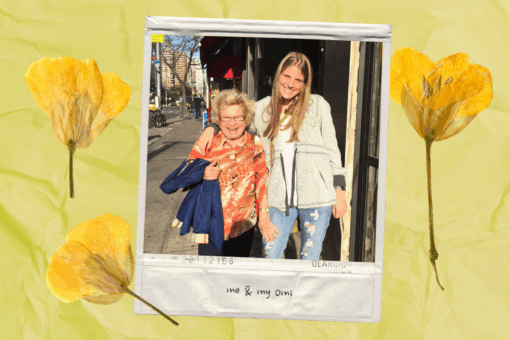I just have so many choices.
This is the thought that kept echoing through my head last night as I left half a glass of wine on the table, as I pulled on my Blundstones, as I threw an ID and my glasses case and a jacket into my bag, as I grabbed a face mask, as I texted a friend to get updates on where the Brooklyn march was headed, as I stepped out my front door, as I joined the crowd walking up Flatbush Ave., as I threw a kippah that said “RABBI” on my head, as I cop watched, as I chanted, as I posted on Twitter, as I peeled off, as I went home, as I deadbolted my door, as I washed my hands, as I finished my glass of wine.
Last night was my first time joining the protests following George Floyd’s murder under the knee of a Minneapolis police officer one week ago, but I doubt it will be the last. These protests will continue, because Black people in this country continue not to be heard, not to be valued, and not to be seen as fully human.
As a white person, I’m part of a system of racism that has plagued the United States since long before its founding. And although as a Jew I suffer from anti-Semitism, I experience the benefits of white privilege every day. With that privilege comes an immense amount of choice.
This article is open to all, but I’ll name here that its central purpose is to help Jews with wealth and white privilege consider their role in standing against racism. White Jews have the choice to look away, but we have a moral obligation to meet this moment head on, with deference to our siblings of color and with commitment to anti-racism on the streets and in Jewish spaces.
And yes, we are in the middle of a pandemic, but this too is deeply connected to issues of race and privilege. In my zip code, there have been to date 613 cases (yes yes, I know — not the point) of COVID-19. In parts of Queens and the Bronx, there are zip codes with over 3,000 cases. I, like many who live in my zip code, am able to work from home, can afford take-out and grocery delivery services, and have access to adequate healthcare. Since March 12, when I began my shelter in place, every time I have left my one-bedroom apartment — occupied by one human and one cat — it has been a choice. I have not been on a train or in a car since March, and I have largely been able to avoid being in spaces with lots of other people. When I have been close to others, it’s been with a mask on and social distancing. I have been quite safe when others, whose work or living situation prevent social distancing, do not have such luxury.
Still, I hesitated to go to the protest yesterday. I was afraid of spreading the virus or having it spread to me. What if other protestors weren’t wearing masks? What if people were crammed so close together that not touching became impossible? I’ve been to many a protest. People get jostled. Crowds get squeezed. Normally that’s just part of the deal and when you get home you wash your hands. Now? It’s different.
Then there was the fear of police brutality — the horrific videos of law enforcement officers around the United States driving cars into protestors, flinging members of the press to the ground, pulling masks from civilians and pepper spraying them, shooting projectiles at people on their front porches. So yes, of course I was frightened by the possibility of cops acting out towards me, or towards people around me.
I also knew that since shelter in place began, I had been able to choose safety, over and over and over again, when others could not. I knew that cops were less likely to physically attack white people or arrest white people than People of Color. I knew that marches were just one of many ways to support this movement, but that for me, it was one thing I could do.
So I went. I joined the crowd. I walked with distance but, frankly, not enough. When we reached Barclays Center and the number of cops started growing like mushrooms in the rain, I made an instinctive beeline from where I was standing in the crowd to plant myself a few feet in front of the line of police, making sure that they could see my white skin and the clergy title scrawled onto my kippah. Could they still attack marchers? Of course. But maybe — just maybe — some of them would hesitate for just a moment, because our society is plagued by many evils, and the same combination of racism and sexism that makes men believe they are stronger than me makes male cops think they should protect me.

The news covering these protests is focused on the fires, on the smashed windows, and on the screaming, but I want to say that what I observed was care. People passing around masks and hand sanitizer and bottles of water. People saying “excuse me” when they needed to walk close so as to avoid touching. People smiling with their eyes because we couldn’t see one another’s mouths. People chanting the names of beloved dead murdered at the hands of racists. Later in the night, after I’d gone home, I heard that the tenor changed, but of all the protests I’ve attended, this was the most marked by a sense of love. And that alone was worth witnessing and building.
I’m white, and this moment isn’t about me. I’ll admit that I hesitated to even write this article, just like I hesitated to post any photos or videos to social media from the protest, because I don’t want to take attention away from those who should be centered. But even though this isn’t about me, it’s exactly about a system in which I am complicit and in which my silence — as a person with power — is dangerous. So I write not to speak over or speak for Black communities and other communities of color but to speak out to white people more afraid of doing the wrong thing than of doing nothing. I write to say that mistakes are inevitable but inaction is immoral. I write to say that writing is not enough.
Not all of us are able to take to the streets, for a variety of valid reasons. But all of us can do something, and we have come to a point where that something must extend beyond self-education. Yes, read the books and watch the videos and learn about the society and the body you inhabit. But also? Give to a bail fund or an organization that is by and for People of Color. Support Black-owned businesses. Take what you’ve learned about systemic racism and talk to other white people about it. Even if they’re family or friends. Especially if they’re family or friends.
When we say tzedek tzedek tirdof l’ma’an tih’yeh v’yarash’ta et ha’aretz asher adonai elohecha notein lach — “Justice justice you shall pursue, that you may live and inherit the land that your Sacred Source is giving to you” (Deut. 16:20) — we must consider the land of the selectively free that we have come into, that our ancestors came to by choice or by necessity or in literal chains. And yet, pay attention to the text. The Torah tells us that the land is being given — in present tense. We are receiving — in present tense. This is the land of now. This is the inheritance of our time. Our task is to pursue justice to make the land that we are living upon live to its highest potential, with justice for all who have come to call it home. We can make choices about how to pursue justice, but we cannot choose, with moral backing, to sit back and wait this out.
Each of us is made in the image of the divine. Each of us carries a sacred spark of elemental energy. Each of us deserves to breathe. No lives matter until Black Lives Matter.
Header Image: May 30, 2020, Brooklyn, New York City. Photo by Pablo Monsalve / VIEWpress via Getty Images. All other images courtesy of the author.



